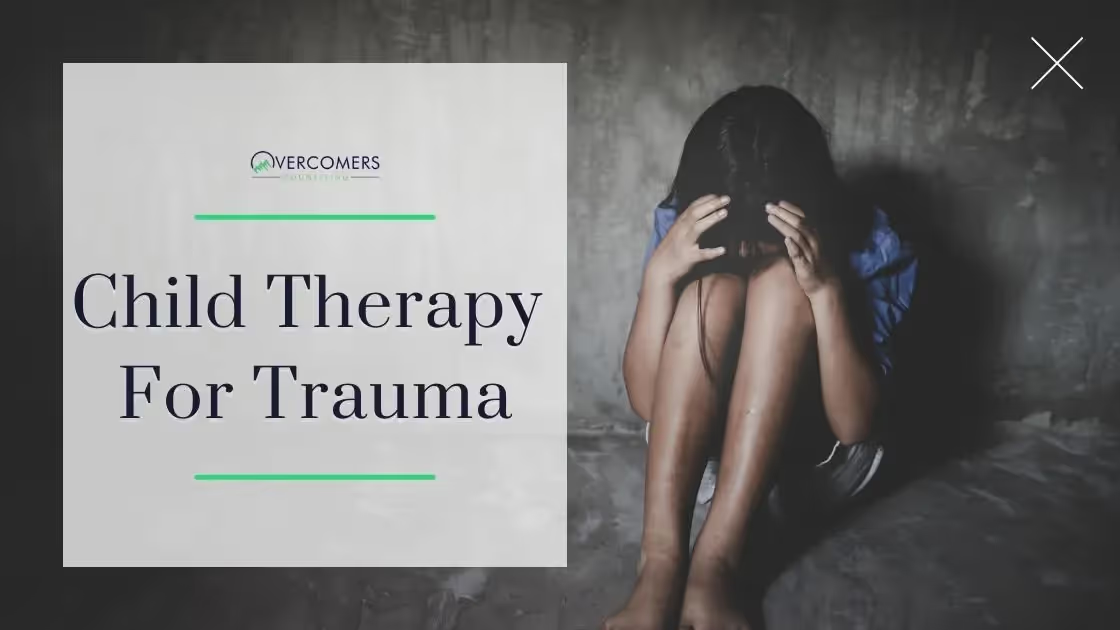As parents, we do all that we can to protect our children. But sometimes, life can throw us some punches, and our children may go through a traumatic event...

As parents, we do all that we can to protect our children.
But sometimes, life can throw us some punches, and our children may go through a traumatic event at one point or another during their childhood.
Maybe they already have, and you are a parent that is looking for help on how to heal them from their trauma. Traumatic stress in children can cause various symptoms.
Many present as:
- Moodiness- Difficulty sleeping- Nightmares- Getting more angry or aggressive- Loss of appetite- Academic problems - Self-esteem issues
Luckily, there are plenty of tools available to help them.
By you getting your child therapy for trauma, a counselor can help them work through their feelings about the prior triggering event, and learn best on how to help your child specifically, just for them.
The most important thing that you can do when looking for someone for your child to talk to, is that your child gets along with them.
The importance of a good and understanding counselor cannot be overstated, especially when it comes to trauma counseling in children.
If you are looking for a counselor, you can see our full list of counselors by clicking here.
Perhaps by speaking to a counselor by yourself first would be a good idea, especially to be able to frankly discuss the trauma that happened in your child's life.
That way they are not around to hear all the details over again, which could be triggering for them.
If you assess that the counselor you spoke to might be a good fit for your child, you can bring your child to a session, and see how they think the counselor is.
Ultimately, your child should like and be comfortable speaking to the counselor that you chose.
The program that many child therapists use when working with children who are trauma patients is called Trauma-Focused Cognitive Behavioral Therapy (TF-CBT).
This technique uses a variety of tools, including play, talk therapy, and doing activities that can help them on the road to healing their trauma.
Trauma-focused CBT also can help parents as well, because, well, let's be honest, any parent would be distraught after their child has gone through a traumatic event.
It could be prudent to make an appointment with a trauma-informed counselor for parents as well.
Being able to openly express what you are feeling about what your child has gone through can be extremely therapeutic and healing.
Therapists can also help to equip parents with the tools that they need to help their child through their traumatic experience.
With TF-CBT, therapists teach parents how to help their child open up about what happened, talk trough their emotions, and begin also healing as a family as well.
Plus, therapists can also give parents techniques on how to help their child cope at home, when they are not at therapy.
Every counselor is different, and that is something to keep in mind when you are looking for a trauma counselor for your child.
There are quite a few different techniques that the counselor can teach your child in order to help them learn how to cope with what happened to them.
Many counselors teach effective breathing techniques that your child can easily use if they feel themselves becoming anxious in a situation.
Other methods that counselors might use emotional regulation, where they will help your child manage the feelings related to the traumatic event.
Many times, counselors will do joint parent-child sessions as well to help you and your child be able to talk about the trauma in a healthy and not destructive or emotional way.
Typically, TF-CBT is a short-term treatment, with treatment typically lasting anywhere between 12-18 sessions. But it all depends on what your child's individual counselor thinks is best.
One exercise that your child's counselor may do is to have your child create a "trauma narrative."
This is essentially where your child goes through a series of exposure exercises.
These can be through writing about the event, or even drawing pictures about what happened.
Some children may even express the narrative through play.
By helping your child create a trauma narrative, your child's counselor is able to help unlock deep feelings about the incident.
Then, they are able to learn how to work through those feelings.
It also helps them to unlock those memories within the safe space of their counselor's office.
It can even help them to reclaim the power that the trauma has had on their life.

If your child has gone through trauma, and you are looking for a counselor for them, just follow the steps below and you will have your child on their way to healing any trauma that they may have experienced.
1. First, when you call (719) 345-2424, you will be greeted by one of our receptionists, who will assist you throughout the call.
2. They will help you book an appointment with the trauma counselor of your choice.
You can see all of our available trauma counselors in by clicking here.
Take some time to look through each counselor to find one that is suitable to your needs or the issues you may be facing.
3. During the initial call, you will be asked for your/your child's insurance and contact information. The receptionist will verify your insurance coverage.
4. Afterwards, an e-mail will be sent to you containing the intake paperwork needed for the first visit.
You may either print it out, fill it out, and bring it with you to your initial visit with your counselor.
Alternatively, you can instead upload the paperwork into our client portal.
5. When the day of your appointment arrives, you (and your child) will be able to speak to your counselor about the trauma that your child endured. They will also be able to explain to you in what exact ways that they can help your child.
At the end of the first session, you will be able to talk to your child's counselor about when you would like your child to see them next, and you can easily schedule their next appointment.
When it comes down to it, your child needs to be comfortable with who they are speaking with.
As their parents, we need to make sure that we assure them that they are okay, and that the trauma is over, especially if they have issues like anxiety about it.
But a child therapy counselor for trauma will be able to help them dig deep and work through the complex emotions that they may be experiencing from the trauma and to help them heal from it.
https://www.healthline.com/health/mental-health/therapy-for-childhood-trauma#effectshttps://kidshealth.org/en/parents/trauma-care.html
https://www.verywellmind.com/trauma-focused-cognitive-behavioral-therapy-2797665
Yes, trauma-informed care can be integrated with various therapy models, including cognitive-behavioral therapy (CBT), dialectical behavior therapy (DBT), psychodynamic therapy, and family systems therapy. The key is to ensure that the chosen therapy model aligns with the principles of trauma-informed care, such as safety, trustworthiness, choice, collaboration, and empowerment.
Yes, trauma-informed care can be integrated with various evidence-based addiction treatment approaches, such as cognitive-behavioral therapy, motivational interviewing, and 12-step programs, to provide comprehensive support for individuals in recovery.
While it is natural to want to avoid triggers, complete avoidance is not always possible or productive.
Instead, focus on developing coping strategies and building resilience to help manage triggers when they arise.
Assertive communication involves expressing your needs and boundaries respectfully and clearly, while still considering the feelings and perspectives of others.Aggressive communication, on the Work with your therapist to develop assertive communication skills and practice implementing these techniques in various contexts.Building confidence in your ability to assert boundaries within therapy can translate to increased assertiveness in other areas of your life as wellother hand, may involve blame, criticism, or disrespect towards others.If you're unsure about your communication style, discuss it with your therapist, who can provide guidance and support.
Educate yourself about trauma and triggers, listen empathetically to your loved one's experiences, and offer non-judgmental support.
Encourage them to seek professional help if they have not already done so, and respect their boundaries and needs during triggering situations.
Take the Next Step with Overcomers Counseling
At Overcomers Counseling, our compassionate and experienced trauma-informed therapists are dedicated to helping you navigate and manage triggers both during and outside of therapy sessions.
We understand the challenges you may face and are committed to providing support, guidance, and tailored strategies for coping with triggers.
Schedule an appointment with one of our skilled therapists today, and let us help you on your path to healing.
If you're struggling with the effects of childhood trauma, there are many ways to get help.
You can talk to your partner about what you're going through, seek help from a therapist or counselor, join a support group, or take care of yourself both physically and emotionally.